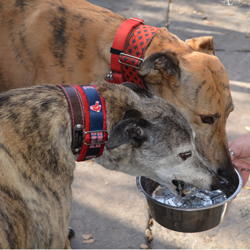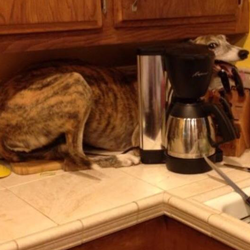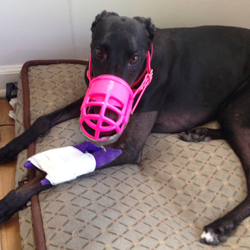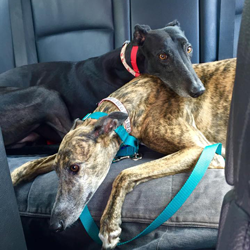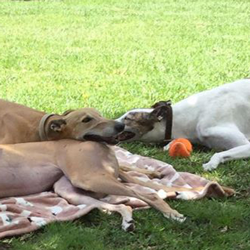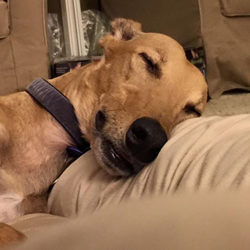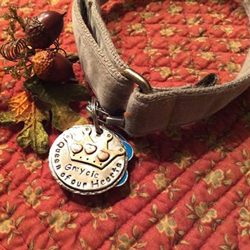GREYHOUND CARE: Vaccinations

GreySave realizes that there is a potential for greyhounds to receive more vaccinations that a non-greyhound, non-track dog would since they come from a very different background. Each state and/or track seems to have a different protocol for when a greyhound needs additional vaccinations. We have researched the topic and understand that all greyhounds, before then can go to the track at approximately 18 months of age, have had all their required shots. The protocol for the vaccinations for the younger greys is driven by the racing industry, overseen by the National Greyhound Association. Once at the track, the vaccination schedule seems to be determined by the individual states and maybe even the specific track. Many of the shot records we have seen from the east and southeast tracks show annual shots, a frequency that would not be currently recommended in the non-track world, at least in California in 2015.
With that in mind, GreySave has developed a vaccination protocol to try to minimize the number and frequency of vaccinations in your greyhound’s future. Here is what we do to help prevent unneeded vaccinations, especially by vets who may not know the racing industries vaccination protocol. If we manage to get the greyhound’s shot records from the track they came from, we will use those dates and reminder times if the next shots are not due in the next 12 months and they are 3 year certified shots. However, the greyhounds we bring in from the Caliente track do not come to us with them their official shot records. We would like to get those records from the track; we know they exist but have not been able to get them. In the absence of receiving shot certificates, we give our greyhounds three year certified Vanguard Plus 5/CV vaccination and our vets give them their 3-year rabies vaccination.
Below is a primer on vaccinations you should know about and maybe share with your veterinarian.
In 2003, the American Animal Hospital Association (AAHA) and the American Veterinary Medical Association (AVMA) supported the recommendations of immunology expert Ronald Schultz, PhD, Diplomate ACVIM (American College of Veterinary Internal Medicine and a member of the AAHA Canine Vaccine Task Force) that the “core” vaccines not be given more frequently than every three years.
It is important for new adopters to be aware of what vaccinations their Greyhound has received, and when, and be prepared to discuss a vaccination plan with their vet. We encourage you to research the new evidence regarding unnecessary annual vaccination and be an advocate for your greyhound. Each adopter is sent a copy of their Grey’s vaccination record within 3-4 weeks of adoption.
There have been several “duration of immunity” (DOI) studies completed on canine vaccines that indicate immunity extends much longer than originally thought. So, rather than “just vaccinate,” some practitioners recommend a “titer test” to determine if your Greyhound still has antibodies to a particular organism. (Antech and Idexx Labs charge $75-150/Hemopet and Dr. R.D. Shultz Laboratory charge $52 and $25 accordingly).
Core Vaccines
According to the AAHA, there are four “core” vaccines needed to protect your dog from severe, life-threatening diseases. Dr. Schultz and other researchers have data showing that after the initial round of vaccines, most dogs will have immunity for life from the first three. Currently, Dr. Schultz is partnering with Dr. Jean Dodds, DVM (who has worked extensively with Greyhounds) on a privately funded Rabies Challenge Study, to prove that rabies vaccination lasts at least 5-7 years, if not longer. However, without a titer test, the current AAHA recommendation is to vaccinate every three years.
Again, based on AAHA guidelines, these vaccines should only be administered to dogs that live in certain locations or have lifestyles that might put them at risk of contracting the disease.
Vaccines not recommended
Per the 2006 AAHA Guidelines, the following vaccines are not recommended:
Although not included in the 2006 AAHA Guidelines, U.C. Davis Veterinary School (ranked #1 vet school for 2015), does not recommend the Rattlesnake Vaccine, saying this:
“injection of the rattlesnake vaccine is not currently advocated by the hospital…it is not recommended by the hospital due to its questionable efficacy, cost, and no substantial difference in acute therapy if bitten.”
The California Rabies Vaccination Exemption Law
Effective January 2011, California law (AB 258) provides for an exemption to the required rabies vaccination when the health of the dog may be put in jeopardy due to the vaccination. This commonly includes dogs that have epilepsy, an auto-immune disease, or are undergoing cancer treatment.
A veterinarian must examine the dog and certify that the dog’s health would be put in jeopardy due to the vaccination. The exemption is good for one year.
With that in mind, GreySave has developed a vaccination protocol to try to minimize the number and frequency of vaccinations in your greyhound’s future. Here is what we do to help prevent unneeded vaccinations, especially by vets who may not know the racing industries vaccination protocol. If we manage to get the greyhound’s shot records from the track they came from, we will use those dates and reminder times if the next shots are not due in the next 12 months and they are 3 year certified shots. However, the greyhounds we bring in from the Caliente track do not come to us with them their official shot records. We would like to get those records from the track; we know they exist but have not been able to get them. In the absence of receiving shot certificates, we give our greyhounds three year certified Vanguard Plus 5/CV vaccination and our vets give them their 3-year rabies vaccination.
Below is a primer on vaccinations you should know about and maybe share with your veterinarian.
In 2003, the American Animal Hospital Association (AAHA) and the American Veterinary Medical Association (AVMA) supported the recommendations of immunology expert Ronald Schultz, PhD, Diplomate ACVIM (American College of Veterinary Internal Medicine and a member of the AAHA Canine Vaccine Task Force) that the “core” vaccines not be given more frequently than every three years.
It is important for new adopters to be aware of what vaccinations their Greyhound has received, and when, and be prepared to discuss a vaccination plan with their vet. We encourage you to research the new evidence regarding unnecessary annual vaccination and be an advocate for your greyhound. Each adopter is sent a copy of their Grey’s vaccination record within 3-4 weeks of adoption.
There have been several “duration of immunity” (DOI) studies completed on canine vaccines that indicate immunity extends much longer than originally thought. So, rather than “just vaccinate,” some practitioners recommend a “titer test” to determine if your Greyhound still has antibodies to a particular organism. (Antech and Idexx Labs charge $75-150/Hemopet and Dr. R.D. Shultz Laboratory charge $52 and $25 accordingly).
Core Vaccines
According to the AAHA, there are four “core” vaccines needed to protect your dog from severe, life-threatening diseases. Dr. Schultz and other researchers have data showing that after the initial round of vaccines, most dogs will have immunity for life from the first three. Currently, Dr. Schultz is partnering with Dr. Jean Dodds, DVM (who has worked extensively with Greyhounds) on a privately funded Rabies Challenge Study, to prove that rabies vaccination lasts at least 5-7 years, if not longer. However, without a titer test, the current AAHA recommendation is to vaccinate every three years.
- Canine Distemper (CDV)
- Canine Parvovirus 2 (CPV-2)
- Canine Adenovirus 2 (CAV)
- Rabies
- Non-core Vaccines
Again, based on AAHA guidelines, these vaccines should only be administered to dogs that live in certain locations or have lifestyles that might put them at risk of contracting the disease.
- Bordetella Bronchiseptica (kennel cough) and parainfluenza
- Borrelia burgdorferi (Lyme)
- Leptospirosis
Vaccines not recommended
Per the 2006 AAHA Guidelines, the following vaccines are not recommended:
- Coronavirus (CCV)
- Giardia
Although not included in the 2006 AAHA Guidelines, U.C. Davis Veterinary School (ranked #1 vet school for 2015), does not recommend the Rattlesnake Vaccine, saying this:
“injection of the rattlesnake vaccine is not currently advocated by the hospital…it is not recommended by the hospital due to its questionable efficacy, cost, and no substantial difference in acute therapy if bitten.”
The California Rabies Vaccination Exemption Law
Effective January 2011, California law (AB 258) provides for an exemption to the required rabies vaccination when the health of the dog may be put in jeopardy due to the vaccination. This commonly includes dogs that have epilepsy, an auto-immune disease, or are undergoing cancer treatment.
A veterinarian must examine the dog and certify that the dog’s health would be put in jeopardy due to the vaccination. The exemption is good for one year.
Links for further information on these recommendations:
2013 Canine Vaccination Guidelines
Rabies Challenge Fund
Exemption from Rabies Vaccination: A Canine Health and Welfare Issue in the Golden State
Article from Dogs Naturally listing Vaccinations requirements
2013 Canine Vaccination Guidelines
Rabies Challenge Fund
Exemption from Rabies Vaccination: A Canine Health and Welfare Issue in the Golden State
Article from Dogs Naturally listing Vaccinations requirements

